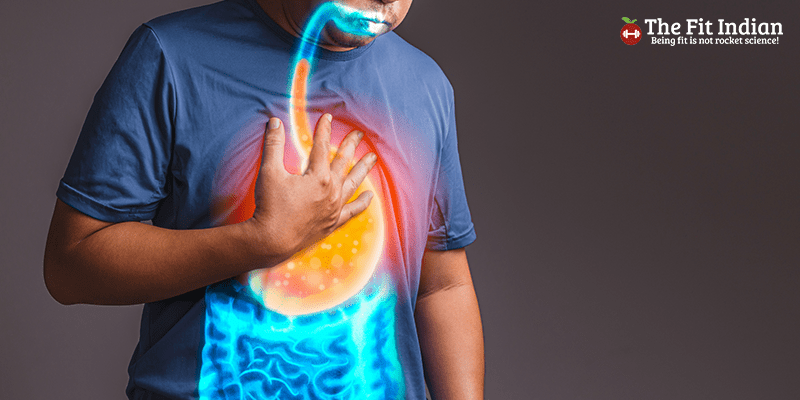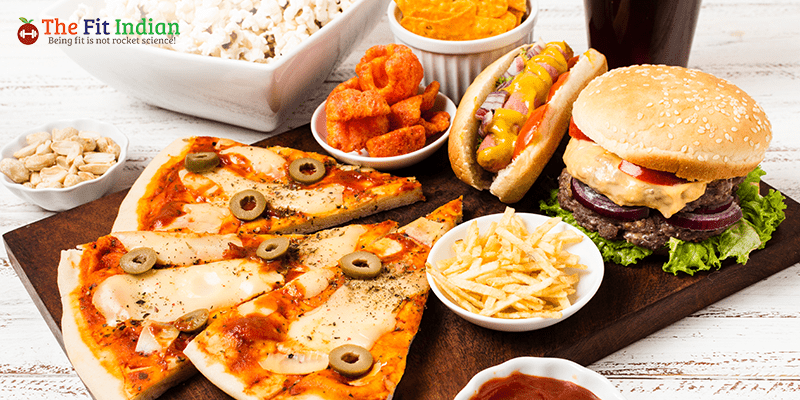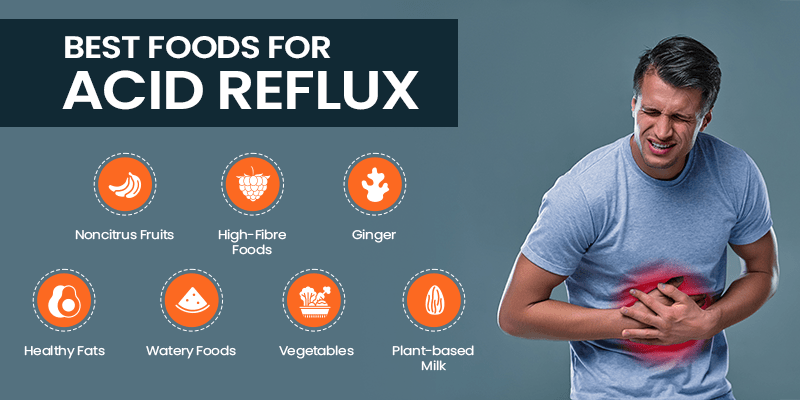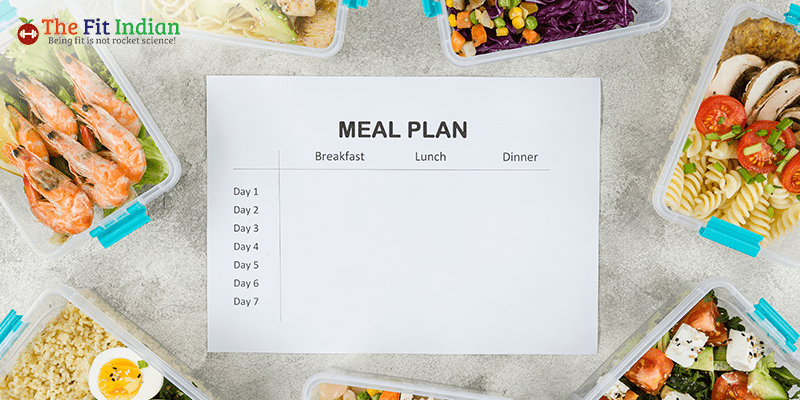7 Best Foods For Acid Reflux – A Diet Plan to Treat Heartburn
Reviewed by: Dr. T S Deepthi Sarojini | Author: Manoja Kalakanti
Is that annoying and, at times, painful burning sensation in your chest bothering you? Considering how common the condition is, it is safe to presume that you have acid reflux. The long-term impact of this condition could be severe; therefore, it is essential to resolve the problem at the onset.

There are myriad factors that cause heartburn, the most common being your diet and lifestyle. The role of food and acid reflux has been deeply studied. What you eat has a massive impact on stomach acids. Hence, the nature of the composition of your food determines its impact on the condition. This article will discuss the 7 best foods for acid reflux, the worst foods, and a complete diet plan to treat heartburn.
So what is acid reflux or GERD? Find out what the disease is all about and more in the article below.
What is Acid Reflux or GERD?
Gastrointestinal Reflux Disease (GERD) or Acid Reflux is a condition where the stomach acids flow back up to the esophagus or the food pipe. This occurs when the lower esophageal sphincter (LES), situated at the stomach entrance and acts as a valve, doesn’t close completely or opens too often. It leads to the acid in your stomach moving up into the food pipe. This is a common condition which is also known as ‘heartburn’. It is usually caused by:
- Being overweight or obese
- Hiatal hernia
- Eating close to bedtime
- Eating a large meal
- Lying down immediately after eating
- Smoking
- Lack of exercise
- Certain medications
- Pregnancy
- Certain foods such as fatty foods, citrus fruits, spicy foods or chocolate.
- Certain drinks such as alcohol, coffee, carbonated beverages or tea.
The impact of diet is well known in both causing and treating GERD.

You are now aware of what acid reflux is and what causes it. But what are the acid reflux symptoms, determine that you suffer from this condition? Here are some of the classic symptoms associated with GERD:
Symptoms of Acid Reflux Disease:
- Heartburn is the most common and well-recognised symptom of heartburn. This is a burning sensation experienced from the stomach to the chest and the throat.
- Burping
- Nausea
- Bloating
- Vomiting
- Wheezing or dry cough
- Throat soreness
- Difficulty or pain swallowing
Since food plays a central part in causing or worsening the condition, it is imperative that you better understand your eating habits. Learn what foods that cause acid reflux and what prevents it. Consult a nutritionist to learn more about this. Keep reading to find out the foods that may trigger heartburn.
Foods and Other Triggers That May Cause Acid Reflux
Heartburn and what you eat are connected. Food can either cause the condition or help you prevent or treat it. Certain foods such as fatty foods can relax the LES, thus increasing reflux, while others high in acidic content worsen the situation.

Here is a list of foods to avoid with GERD. Avoiding or limiting these foods will bring relief and help you overcome the symptoms associated with acid reflux.
- Alcohol, particularly red wine
- Black pepper, garlic, raw onions
- Spicy foods
- Chocolate
- Citrus fruits such as lemons, oranges and orange juice
- Coffee and caffeinated drinks, including tea and soda
- Peppermint
- Tomatoes
- Fried food
- Fast food
- Pizza
- Potato chips and other processed snacks
- Chilli powder and pepper (white, black, cayenne)
- Fatty meats such as bacon and sausage
- Cheese
- Carbonated beverages
Avoiding some of these foods may be difficult as they have become an integral part of our diet. Read on to find out the best foods for GERD that you must include in your daily diet.
7 Foods That May Help Prevent Acid Reflux
The above foods may trigger heartburn and worsen the symptoms, so it is imperative that you consume foods that counteract the effects.

The following foods are low in acidic content; hence they have a soothing effect on the stomach. They may not cure the condition but will provide much-needed relief.
- Noncitrus Fruits
While citrus fruits such as oranges can trigger acid reflux, non-citrus fruits are less likely to cause problems. Non-citrus fruits such as bananas, apples, and watermelons are excellent nutrition sources and safe to eat for people suffering from this condition.
- High-Fibre Foods
Overeating is one of the causes of GERD. Foods rich in fibre keep you feeling full and thus prevent you from overeating. Fibre may also absorb stomach acid. Therefore you must include fibre-rich foods such as brown rice, oatmeal and beans in your diet.
- Ginger
Ginger is one of the best foods to treat this condition, and it is generally recommended for any gastrointestinal problems. It is its anti-inflammatory properties that give it the ability to resolve these issues. Ginger is also easy and versatile in its consumption; you can add it to meals, tea or eat it directly.
- Healthy Fats
While saturated and trans fats can exacerbate heartburn, healthy fats are safe to consume and even help relieve the symptoms. Healthy fats sources include olive oil, avocados, sunflower oil and walnuts.
- Watery Foods
Foods rich in water content can dilute the stomach acid, thus providing relief from the symptoms. These foods include watermelon, cucumber, herbal tea, and cantaloupe.
- Vegetables
Vegetables are a must in your diet for myriad reasons. They are highly nutritious, help prevent or treat many health problems, including acid reflux. Vegetables do not contain contents usually responsible for GERD; they are low in fat and sugar. Include vegetables such as peas, cauliflower, carrot, broccoli and green leafy vegetables in your daily diet.
- Plant-based Milk
Is milk good for acid reflux? This is one of the first questions that come to mind when a person suffers from GERD. This is because dairy products such as high-fat milk and cheese are known to cause gastrointestinal issues. On the other hand, plant-based milk such as soy and almond milk are much easier on your stomach, thus making them a better choice for people with this condition.
Now that we have seen what is good for acid reflux, as far as food is concerned, let’s look at some other ways through which this condition can be treated.
Other Ways to Treat Heartburn
Although food plays a crucial role in causing and preventing GERD, it isn’t the only factor that impacts the condition. Acid reflux can be caused by lifestyle, and modifications can also prevent or treat it. Follow these tips to find relief from heartburn.
- Quit smoking
- Manage your weight
- Sleep with your head elevated, preferably on the left side
- Avoid lying down immediately after a meal
These small changes can have a significantly positive impact on the condition and its symptoms. If you are wondering what a daily diet plan for someone with acid reflux looks like, keep reading.
Diet Plan to Relieve Symptoms and Prevent Acid Reflux
As you already know, food plays a primary role in the cause and the prevention of GERD. Eating foods that positively impact people with the condition and avoiding ones that could worsen the situation is already discussed. But it is also essential to follow a proper daily diet plan to overcome the symptoms of acid reflux.

The following diet plan can significantly manage the condition. Follow this best diet for GERD to manage your symptoms and find relief from heartburn.
| Early Morning | Lukewarm water with jeera (crushed) – 1 glass/Boiled Fennel seeds -1 glass
Exercise – 30 minutes (daily) |
| Breakfast | 3 Idlis/2 Dosas (medium size)/ 1 cup Poha with vegetables
Coriander chutney/Pudina chutney – 1 cup/Coconut chutney – 1 cup |
| Mid Morning | Fresh juice (watermelon) – 1 glass/ 1 Guava/ Papaya – 1 cup |
| Lunch | Soft cooked brown rice – 1 cup/Quinoa vegetable upma – 1 cup
Thin dal + Green leafy vegetables – 1 cup/Dal + Bottle Gourd curry – 1 cup Vegetable Salad – 1 cup (Cucumber/Carrot) Curds – 1 cup (Low-fat dairy) |
| Evening | 3-4 Soaked Almonds
Green tea – 1 cup/Black tea – 1 cup |
| Dinner | 2 Rotis/1 Jowar roti/Daliya with vegetables – 1 cup
Cauliflower and peas curry – 1 cup/Mixed vegetable curry – 1 cup Thin Buttermilk – 1 glass |
| Bedtime | A Fruit |
| Lifestyle Modifications | Avoid |
| 1. Eat mindfully
2. Exercise regularly 3. Drinking enough water 4. Get enough sleep 5. Sleep on your left side 6. Chew well |
1. Spicy food
2. Irregular habits of foods 3. Avoid junk food, carbonated beverages 4. Stay away from smoking and alcohol 5. Avoid eating for a few hours before bed 6. Avoid saturated fats |
Some tips from our Nutritionists:
- Choose a cooking method: Prefer boiling or grilling.
- Include freshly cooked vegetables.
- Add more complex carbohydrates.
- Increase intake of fruits and vegetables.
- Include more fibre-rich foods.
- healthy smoothies.
- Include nuts and seeds.
The plan above is the best diet for acid reflux. If you wish to get a complete customized diet plan to treat the condition, get in touch with a nutritionist.
Bottomline
GERD or acid reflux can be prevented and treated with lifestyle modifications, especially a change in diet. Food is often the cause and also the solution to the problem. A proper diet plan should be able to help you overcome the condition. If the symptoms cannot be managed or they are too severe, consult a doctor. In this case, medication or surgery may be required.
FAQ’s
- What food helps heartburn go away?
The best foods for heartburn are ginger, healthy fats, vegetables, plant-based milk, foods high in fibre, non-citrus fruits, and watery foods.
- What is a good breakfast for acid reflux?
An ideal breakfast for people suffering from this condition can include idli, dosa, or poha accompanied by coconut or coriander chutney.
- What fruit is good for acid reflux?
Non-citrus fruits such as banana, guava or papaya and watery fruits such as watermelon and cantaloupe are considered good for acid reflux.
- What can stop acid reflux immediately?
To reduce the symptoms of the condition, you can drink a bit of apple cider vinegar, eat some ginger, stand upright or chew gum.
- What is the fastest way to neutralize stomach acid?
Baking soda or lemon juice mixed with water and honey are two of the most effective ways to neutralize stomach acid.
- Does drinking water help with heartburn?
Yes. It is considered to be one of the most effective ways to deal with heartburn. Drinking water can reduce acidity and relieve the symptoms of the condition.
- What foods are worst for acid reflux?
The worst foods for acid reflux are fried foods, fast foods, cheese, spicy foods, chocolate, fatty meats, and pizza.
- What drinks help with heartburn?
Water, coconut water, plant-based milk, fruit juices and herbal tea are some of the best drinks to help with heartburn.
- What snacks are good for acid reflux?
Baked chips, nuts, non-citrous fruits, and edamame are some of the best snacks for people with the condition.
- Are apples good for acid reflux?
Although there is not enough evidence to back the theory that apples are good for this condition, many people claim to have seen positive results from eating apples. The fruit also provides several other benefits.




Manoja Kalakanti